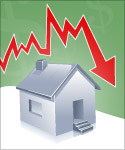The stock market's recent surge has many investors basking in the sunshine of record highs. But beneath the surface, a rumble of concern is emanating from a sector of Wall Street known as the bears. These financial experts, ever watchful for potential pitfalls, are issuing a range of dire predictions, casting a shadow over the seemingly bullish market.
65% Stock Market Crash is Predicted for 2024
Let's dissect some of the most prominent bearish outlooks and the reasoning behind them:
- Recessionary Rhapsody: Veteran economist Gary Shilling isn't shy about painting a bleak picture. He predicts a recession taking hold of the U.S. economy by year-end, fueled by a perceived weakening job market. This economic downturn, he suggests, would trigger a 30% plunge in the stock market as investor confidence takes a nosedive.
- Crash Course: Portfolio managers aren't holding back on dramatic pronouncements either. Some warn of a potential 65% collapse in the S&P 500, a key stock market index that tracks the performance of leading American companies. This terrifying forecast rests on the belief that the market is currently inflated beyond its true value, making a significant correction inevitable.
- Echoes of 1929? For some analysts, the current market frenzy evokes unsettling parallels to the infamous 1929 stock market crash. They see similarities in the exuberant buying sprees and the inflated valuations that preceded that historic collapse, raising concerns about a potential repeat performance.
It's important to remember, however, that not everyone on Wall Street subscribes to this wave of pessimism. Bulls, the ever-optimistic counterparts to the bears, believe the economic recovery is on solid ground and the stock market rally has room to run further. Their rationale often hinges on factors like healthy corporate earnings, continued low unemployment, and historically low interest rates.
So, the million-dollar question remains: should you be preparing for the worst? Financial experts recommend a measured approach, advising investors to take these forecasts with a healthy dose of skepticism. The inherent uncertainty of the future makes predicting the market's exact movements a notoriously difficult feat. Here are some proactive steps you can take to navigate this period of contrasting predictions:
- Knowledge is Power: While these forecasts may be unsettling, they serve as valuable reminders of the inherent risks involved in investing. Stay informed about economic data and keep a watchful eye on market trends. A well-informed investor is a better-equipped investor. Resources like financial news outlets, reputable investment websites, and annual reports from the companies you're interested in can be invaluable sources of information.
- Diversification is Key: The age-old adage of not putting all your eggs in one basket rings true in the investment world as well. Spreading your investments across various asset classes, such as stocks, bonds, and real estate, can help mitigate risk. By doing so, you'll be less vulnerable if one particular sector takes a downturn. For example, if the stock market experiences a correction, bonds, which tend to have an inverse relationship with stocks, may rise in value to offset some of those losses.
- Know Your Risk Tolerance: Investing is a personal journey, and your investment strategy should reflect your individual comfort level with risk. If you're nearing retirement or have a low risk tolerance, a more conservative investment approach that prioritizes stability over high returns might be more suitable. Conversely, younger investors with a longer time horizon may be able to stomach a higher degree of risk in pursuit of potentially greater returns. Consider factors like your age, financial goals, and overall risk tolerance when crafting your investment strategy.
- Consider Consulting a Financial Advisor: A qualified financial advisor can be a valuable asset, especially during times of market uncertainty. They can help you assess your risk tolerance, develop a personalized investment strategy, and guide you through the often-complex world of investing. Look for an advisor who is a fiduciary, which means they are legally obligated to act in your best interests.
The stock market has a long history of weathering storms. While a downturn is a possibility we should always be prepared for, it's crucial to remember that economic cycles are cyclical. Even if a correction materializes, the market has a proven track record of bouncing back and reaching new heights over time. So, stay informed, invest wisely, and weather the storm with a well-diversified portfolio, a long-term perspective, and a dash of healthy skepticism when it comes to dire predictions.




